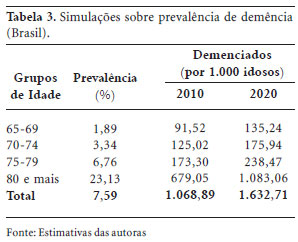It is only to be expected that the elderly population manifests a high prevalence of chronic diseases that jeopardize their autonomy. One example is syndromes of dementia. The scope of this paper is to make projections of the number of elderly individuals with dementia. An estimate of the current number is made by applying age-related prevalence data to the population of 65 and over, by age-group, with the figures from the Brazilian Demographic Census of 2010. The data were obtained from assessments found in the literature. For a national measure, a weighted average of the estimated prevalence was used. Prevalence rates by age and gender were calculated for the elderly Brazilian population. Current investigations show a steep increase of dementia with age. Women and illiterate individuals have a higher prevalence. The mean prevalence in Brazil is higher than that found in the rest of the world. Projections for the Brazilian population point to a small increase in the prevalence of dementia in the 65+ age-group, from 7.6% to 7.9% between 2010 and 2020, which means 55,000 new cases a year. Dementia is a public health issue, and elicits a strong bioethical concern with aging, due to the loss of autonomy of the affected individuals and the responsibility of the health system to provide adequate care.
Dementia; Ageing; Demography; Bioethics



